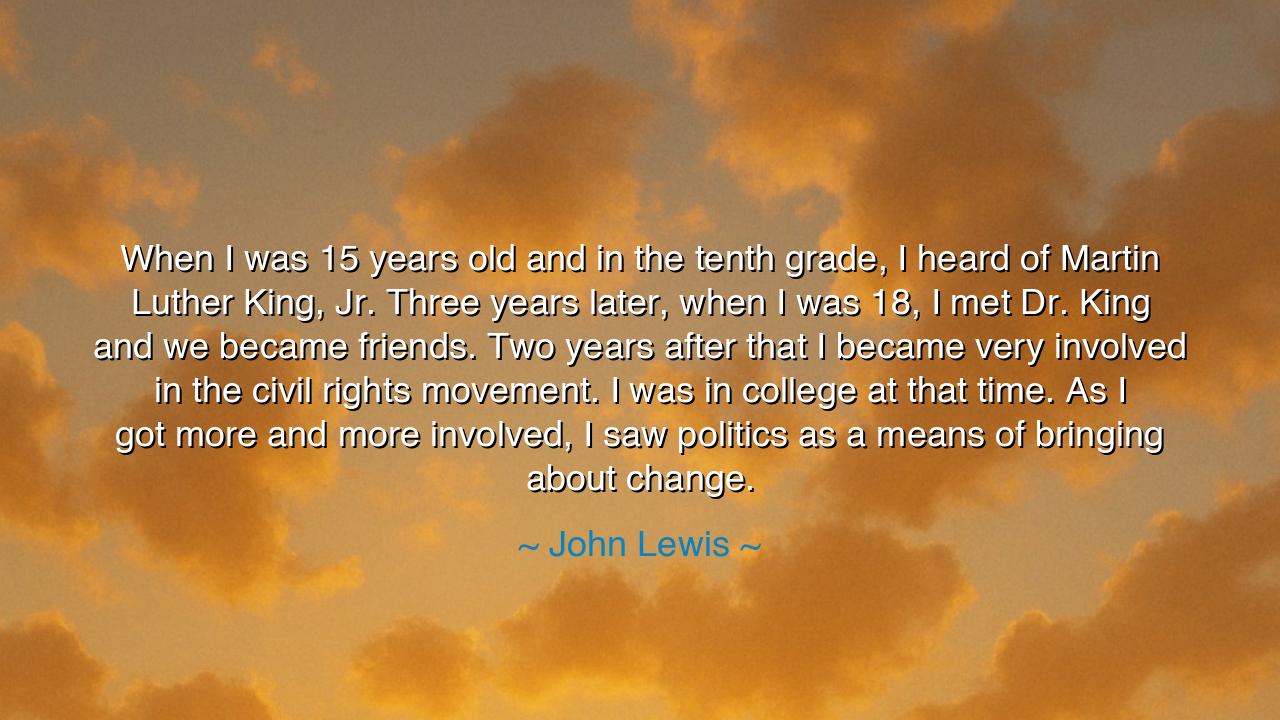
When I was 15 years old and in the tenth grade, I heard of
When I was 15 years old and in the tenth grade, I heard of Martin Luther King, Jr. Three years later, when I was 18, I met Dr. King and we became friends. Two years after that I became very involved in the civil rights movement. I was in college at that time. As I got more and more involved, I saw politics as a means of bringing about change.






The words of John Lewis rise like a torch carried through the storm: “When I was 15 years old and in the tenth grade, I heard of Martin Luther King, Jr. Three years later, when I was 18, I met Dr. King and we became friends. Two years after that I became very involved in the civil rights movement. I was in college at that time. As I got more and more involved, I saw politics as a means of bringing about change.” In this testimony, Lewis tells not only the story of his youth, but of his awakening—the moment when the fire of justice took root in his soul.
He shows us that the seeds of destiny are often planted in the young. At 15, he heard the voice of Dr. King, and though only a boy, his spirit recognized the call. At 18, meeting King face to face, friendship deepened inspiration into resolve. By 20, he was no longer an observer but a participant, marching, protesting, and risking his life for freedom. In his own words, we see the unfolding of a life’s path, each step carrying him deeper into the struggle for justice.
The civil rights movement was the crucible in which Lewis was forged. He marched at Selma, where the Edmund Pettus Bridge was stained with blood as peaceful demonstrators were beaten by troopers. He bore those blows himself, his skull fractured, his body broken, yet his spirit unyielding. From this suffering, he learned what his quote proclaims: that politics, though flawed and perilous, was the instrument by which real change could be secured—not merely for himself, but for millions.
History is filled with similar awakenings. The young Alexander the Great, inspired by Aristotle’s teachings, sought to shape the world through conquest. But Lewis’s ambition was nobler: not to conquer, but to liberate. His vision was not of empires, but of equality. He shows us that the greatest warriors of history are not always those with swords, but those who carry principles into the battlefield of society.
So let the generations remember: change begins with the stirring of the heart, with hearing a voice, with answering a call. The youth who listens today may become the leader of tomorrow. Lewis teaches that politics is not a game of ambition, but the channel of justice, the way by which the cries of the oppressed are translated into laws, rights, and freedoms. To embrace politics with such a spirit is to wield it not as a weapon of self, but as a force of liberation.






THNguyen Tran Trung Hieu
John Lewis’ quote reminds us that activism often starts from small moments of awareness. For him, it was first hearing about Dr. King, then meeting him, and finally becoming deeply involved in the civil rights movement. This gradual progression made me wonder, what causes today’s young people to take action? Are they as motivated to get involved politically, and do they see the potential for meaningful change in politics, or do they feel disillusioned by the system?
Eertertreter
John Lewis' journey from an admirer of Dr. King to a key figure in the civil rights movement shows how personal relationships can influence larger societal change. It makes me think about the significance of mentorship in sparking political involvement. How do we, as a society, foster these types of relationships today? Do young people today have the same access to influential mentors who can inspire them to get involved in meaningful causes?
AMTri A ma
What I find powerful about John Lewis' quote is how it emphasizes the evolving nature of activism. As he moved from learning about the civil rights movement to participating, he saw politics as a vehicle for change. I wonder how many young people today still see politics in this way, or if they view it more as a system of bureaucracy. How can we reignite the passion for political activism that was so prevalent in the 60s for today’s generation?
TNDuc Tai Ngo
John Lewis’ personal story highlights the importance of engaging with politics and seeing it as a tool for change. At what point do we as individuals realize that politics can be a means of social transformation? How much of this awareness depends on mentorship or role models like Dr. King? Can we do more to help young people see the potential in politics to create real-world impact and not just a career choice?
AOLan anh offical
This quote shows how John Lewis' early exposure to civil rights and meeting Dr. King had such a profound impact on him. It makes me think about how formative experiences, especially in one’s teenage years, can drive a lifelong commitment to social justice. How often do we, as a society, overlook the power of mentorship and connection in inspiring young people to take action? How can we create more opportunities for young people to connect with the leaders of today’s social movements?